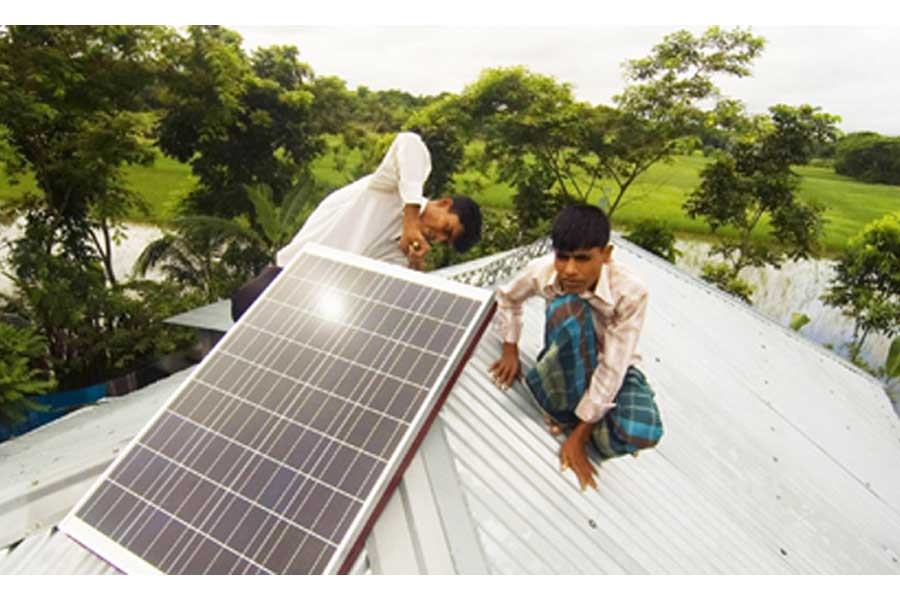Investment of about Tk 20 billion in the country’s potential solar home system (SHS) has got stuck at consumer level.
Those concerned say lack of coordination among government entities in rural electrification has put the state-owned Infrastructure Development Company Limited (IDCOL) and its partner organisations (POs) into a great trouble.
These partners, according to the sources in renewable energy sector, are now desperately pursuing the government's top-level policymakers to find out a mechanism to realise their stuck-up money, but getting little response.
Once world-acclaimed SHS programme as a result has been facing serious setback as its monthly installation has come down to average 2,000 in recent months from 60,000 in 3-4 years back, IDCOL officials admitted.
Sources also said about 4.1 million SHSs have been installed across the country with IDCOL's financing of Tk 40 billion in the last 10-12 years, with its POs investing more than 15 billion.
The IDCOL finances up to 70 per cent of the cost in a solar home system while the POs, which are mainly from private sector and NGOs, invest 30-40 per cent.
The sources said IDCOL's fund mainly came from donor agencies as grant, but it was distributed as loan among the POs with 6-9 per cent interest.
Both were happy with the programme until the government's rural electrification programme started in 2015, they added.
In the IDCOL programme, the PO installed solar panel at consumers' houses on a hire-purchase basis, where a consumer pays the price of the panel in three years' time through monthly instalment.
But when the solar consumers started receiving REB electricity, they simply started pulling out the solar equipment and stopped paying the monthly instalments which put both the IDCOL and the POs into trouble.
"In such a way, about Tk 20 billion have been stuck up in the market," said an official of a partner organisation adding that in many areas the expansion of solar electricity programme came to a halt.
He said the free distribution of solar panel under the government's TR-Kabikha project and sale of substandard panel in local market also made the situation worse.
Many PO Forum officials said they have been going through tremendous financial hardship and many of the POs are not being able to pay back the loans they received from the IDCOL.
Describing all the problems facing at the field level, IDCOL Partner Organisation (PO) Forum-a representative body of the POs-wrote to the chairman and CEO of the IDCOL on a number of occasions to take necessary measures so that their stuck-up money could be realised.
"But in the last six months, there was no progress in this regard," said a top official of the PO Forum.
He mentioned that the PO Forum has submitted a number of suggestions to the IDCOL, including making an arrangement with REB, so that no consumer gets REB electricity connection until the solar home systems' full payment is made.
When contacted, IDCOL's CEO Mahmud Malik admitted about the situation and said his organisation has been trying to overcome the situation.
UNB said he also emphasised coordination among the state-entities in rural electrification programmes.
REB Chairman Major General Moinul Islam said his organisation is ready to help IDCOL and POs in this regard so that their stuck-up money could be realised.
Md Alauddin, Power Division Joint Secretary, said he was also informed about the problems in solar home system programme.


